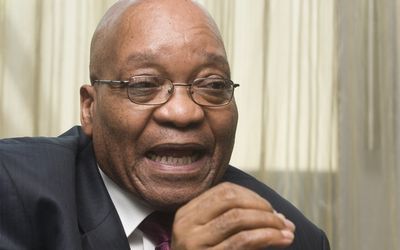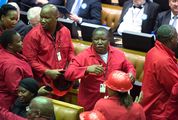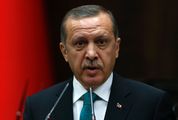WHEN President Jacob Zuma concluded his 2009 state of the nation address, the African National Congress (ANC) benches burst into song, "Zuma, my president!". He gleefully acknowledged the praise with his customary clasp of both hands accompanied by a deep bow and a broad smile.
It was a moment of triumph. In just over a year, we would be hosting the 2010 World Cup, an event that was skilfully integrated into an aggressive, R700bn-plus infrastructure investment programme that picked up under Kgalema Motlanthe’s short tenure. A promise of 5-million jobs, a new department of economic development, a brand-new finance minister and a mooted National Planning Commission — the new man at the helm started strong. Even his political opponents grudgingly acknowledged he had tried to hit the right notes, albeit with a turgid delivery.
Seven years on, Zuma will ascend to the same podium to address a vastly different Parliament and national mood. The Economic Freedom Fighters’s Julius Malema, once an oft-praised protegé, will be staring at him from the opposition benches, a reality that must fill Zuma with a combination of irritation and anxiety. The former has been a thorn in his side, and has threatened to make his speech unpleasant, again.
A key question is whether Zuma will be honest in his appraisal of the general situation in the country, especially its economy and finances. More than ever before, the economy has become so fundamental to what happens next in our politics that to gloss over it would be a profound omission. Last year’s economic growth is expected to come in at about 0.7%.
Unemployment is higher, both in quantum and rate, while tax revenues are under significant strain. Government debt is accelerating as fast as we are required to service it. Making matters worse in this respect is that the market turmoil that followed the irresponsible decision to turf out Nhlanhla Nene as finance minister late last year, worsened our sovereign debt situation. In fact, that very week, the Treasury was raising about R7bn at a higher rate than it had expected just a few days before. Existing debt is also now more expensive.
At the heart of Zuma’s speech, therefore, must be a very concrete outline of urgent steps the government will be taking to arrest the decline in state finances. This requires that he takes his cue from Nene’s medium-term budget policy statement in October last year that stated clearly that state finances would not improve unless the economy grew faster. It is doing the opposite.
In a way all of this should be easy to say. What matters is whether he is able to get anything done. After six years of trying, there is reason to ask whether the economic and industrial policy combination he has in Rob Davies and Ebrahim Patel really works. The results, unfortunately, are more worrying than exciting, even when you factor in external factors.
A key strategic conundrum is how to shift thinking from "state-led" economic activity to efficient collaboration with the private sector. The state’s deteriorating finances, which are expected to result in significant budget cuts this year, mean this ideological fantasy should be put to pasture. It must be painful to have to implement tougher cost-control measures in an election year.
Ideally, the ANC should be spending more to impress voters, but then this is a self-inflicted situation. It has to contain costs now, implement policy measures to grow the economy and hope that it does well in the local government elections.
That is the only way Zuma can hand his successor in 2019 any chance of retaining the party’s political dominance. Failure to do so will mean Malema and the rest of the opposition loom ever larger, not just in front of Zuma this week, but in the path of the governing party’s future.
Failure to appraise the situation honestly, and set out a framework for dealing with it, will undermine Finance Minister Pravin Gordhan’s budget later this month. As happened to his predecessor, Nene, some of his colleagues will try to position him as a lone wolf who believes the Treasury is "a state within a state", and so must be brought to heel. It was their demonstration of this belief through their belligerent response to Nene’s budget presentation at the last Cabinet meeting of 2015 that opened the door wide for his dismissal hours later. It was the Treasury and its minister, they appeared to believe, that was refusing to produce the money they needed for their long wish list, not the economy and the policies that shape it.
More succinctly, Zuma must demonstrate that this madness is a thing of the past or we will sink deeper into an economic abyss only a few of us can handle.
...
WE ARE supposed to defend to death the right of those we disagree with to participate in the marketplace of ideas. Malema’s announcement last week that the New Age and ANN7 would no longer be allowed to attend the EFF’s events is wrong.
If he and his party are honest about their support for the Constitution they say they are approaching the courts to defend over the Nkandla issue, they must unequivocally rescind this decision. The ambiguous backtracking during the past few days is simply not good enough.

President Jacob Zuma. Picture: MARTIN RHODES
WHEN President Jacob Zuma concluded his 2009 state of the nation address, the African National Congress (ANC) benches burst into song, "Zuma, my president!". He gleefully acknowledged the praise with his customary clasp of both hands accompanied by a deep bow and a broad smile.
It was a moment of triumph. In just over a year, we would be hosting the 2010 World Cup, an event that was skilfully integrated into an aggressive, R700bn-plus infrastructure investment programme that picked up under Kgalema Motlanthe’s short tenure. A promise of 5-million jobs, a new department of economic development, a brand-new finance minister and a mooted National Planning Commission — the new man at the helm started strong. Even his political opponents grudgingly acknowledged he had tried to hit the right notes, albeit with a turgid delivery.
Seven years on, Zuma will ascend to the same podium to address a vastly different Parliament and national mood. The Economic Freedom Fighters’s Julius Malema, once an oft-praised protegé, will be staring at him from the opposition benches, a reality that must fill Zuma with a combination of irritation and anxiety. The former has been a thorn in his side, and has threatened to make his speech unpleasant, again.
A key question is whether Zuma will be honest in his appraisal of the general situation in the country, especially its economy and finances. More than ever before, the economy has become so fundamental to what happens next in our politics that to gloss over it would be a profound omission. Last year’s economic growth is expected to come in at about 0.7%.
Unemployment is higher, both in quantum and rate, while tax revenues are under significant strain. Government debt is accelerating as fast as we are required to service it. Making matters worse in this respect is that the market turmoil that followed the irresponsible decision to turf out Nhlanhla Nene as finance minister late last year, worsened our sovereign debt situation. In fact, that very week, the Treasury was raising about R7bn at a higher rate than it had expected just a few days before. Existing debt is also now more expensive.
At the heart of Zuma’s speech, therefore, must be a very concrete outline of urgent steps the government will be taking to arrest the decline in state finances. This requires that he takes his cue from Nene’s medium-term budget policy statement in October last year that stated clearly that state finances would not improve unless the economy grew faster. It is doing the opposite.
In a way all of this should be easy to say. What matters is whether he is able to get anything done. After six years of trying, there is reason to ask whether the economic and industrial policy combination he has in Rob Davies and Ebrahim Patel really works. The results, unfortunately, are more worrying than exciting, even when you factor in external factors.
A key strategic conundrum is how to shift thinking from "state-led" economic activity to efficient collaboration with the private sector. The state’s deteriorating finances, which are expected to result in significant budget cuts this year, mean this ideological fantasy should be put to pasture. It must be painful to have to implement tougher cost-control measures in an election year.
Ideally, the ANC should be spending more to impress voters, but then this is a self-inflicted situation. It has to contain costs now, implement policy measures to grow the economy and hope that it does well in the local government elections.
That is the only way Zuma can hand his successor in 2019 any chance of retaining the party’s political dominance. Failure to do so will mean Malema and the rest of the opposition loom ever larger, not just in front of Zuma this week, but in the path of the governing party’s future.
Failure to appraise the situation honestly, and set out a framework for dealing with it, will undermine Finance Minister Pravin Gordhan’s budget later this month. As happened to his predecessor, Nene, some of his colleagues will try to position him as a lone wolf who believes the Treasury is "a state within a state", and so must be brought to heel. It was their demonstration of this belief through their belligerent response to Nene’s budget presentation at the last Cabinet meeting of 2015 that opened the door wide for his dismissal hours later. It was the Treasury and its minister, they appeared to believe, that was refusing to produce the money they needed for their long wish list, not the economy and the policies that shape it.
More succinctly, Zuma must demonstrate that this madness is a thing of the past or we will sink deeper into an economic abyss only a few of us can handle.
...
WE ARE supposed to defend to death the right of those we disagree with to participate in the marketplace of ideas. Malema’s announcement last week that the New Age and ANN7 would no longer be allowed to attend the EFF’s events is wrong.
If he and his party are honest about their support for the Constitution they say they are approaching the courts to defend over the Nkandla issue, they must unequivocally rescind this decision. The ambiguous backtracking during the past few days is simply not good enough.





















Change: 1.19%
Change: 1.36%
Change: 2.19%
Change: 1.49%
Change: -0.77%
Data supplied by Profile Data
Change: -0.19%
Change: 0.69%
Change: 1.19%
Change: 0.00%
Change: 0.44%
Data supplied by Profile Data
Change: 0.62%
Change: 0.61%
Change: 0.23%
Change: 0.52%
Change: 0.12%
Data supplied by Profile Data
Change: -0.21%
Change: -1.22%
Change: -0.69%
Change: -0.51%
Change: 0.07%
Data supplied by Profile Data